- HOME
- NOTICES
- Seminar Report “Power of tournament incentives: Evidence from Japanese corporate boards.”
Seminar Report “Power of tournament incentives: Evidence from Japanese corporate boards.”
On Friday, June 7, 2019, RCAPS welcomed Prof. UCHIDA Konari of Kyushu University to deliver an Onigiri Seminar.[Report by Prof. FAN, Pengda (APM)]
On Friday, June 7, 2019, Dr. Konari Uchida, who is a professor from Kyushu University, was invited to deliver a RCAPS Seminar entitled “Power of tournament incentives: Evidence from Japanese corporate boards.” His research attempts to answer the question of: “Does international convergence of corporate governance toward US good practices improve performance of local companies?” By using 35,457 firm-years involving 3,185 Japanese listed, he showed that Japanese firms with many inside directors younger than the top manager (junior directors) frequently replace managers. The proportion of junior directors over non-top manager directors is positively associated with firm performance. Those results suggest that firms with many junior directors conduct frequent turnovers to provide tournament incentives to young directors and fierce competition among them creates value. This is the first study to show evidence that age structure of corporate boards is associated with board functions and firm performance.

Prof. UCHIDA, Konari (Kyushu University)

After Professor Uchida’ presentation, Associate Professor Nakajima discussed this paper. Specifically, he first explained the models (e.g., GMM, IV regressions) used in this research to the undergraduate students, which was very useful for them. Then he summarized this research and raised some questions. For example, he was wondering whether Japanese firms with many inside directors younger than the top manager tend to take more risks. In addition, he also suggested that it would be interesting to examine this issue by using an event-study method. Finally, he mentioned that main bank system might also have some effects on this tournament incentives.
At the end of the seminar, five undergraduate students and two graduate students consulted with professor Uchida and sought suggestions for their own research. One student raised a research topic on the optimal decision making for financial institutions while another graduate student asked about the main bank system.
Overall, this seminar was successful because it offered a great opportunity for APU faculty and students to engage in and exchange their respective research ideas.
- TOPIC
- セミナー

